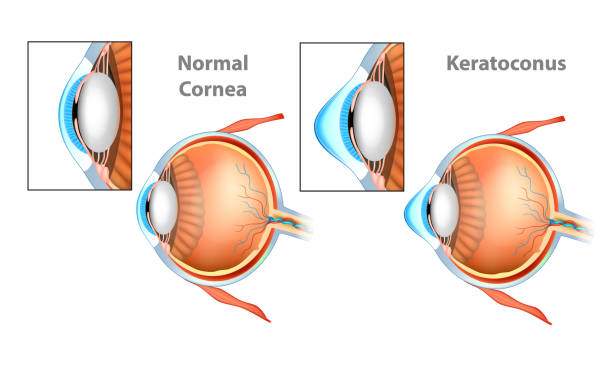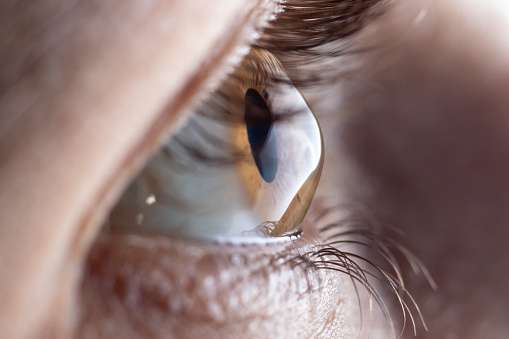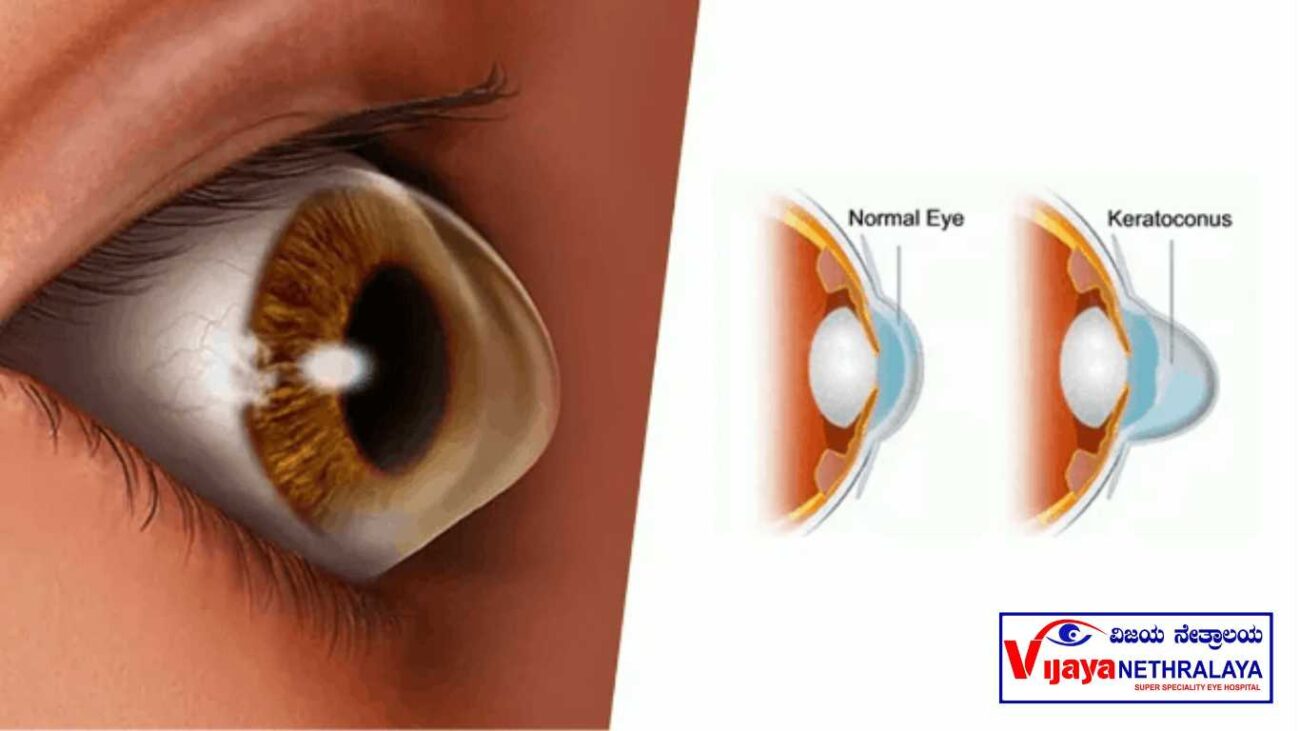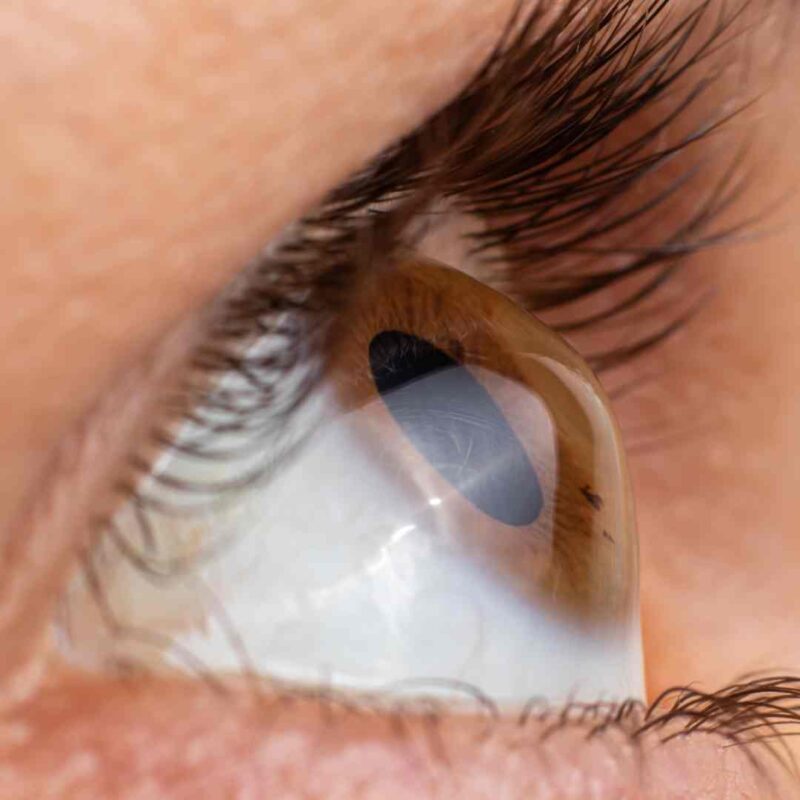Keratoconus / Keratokonus is a vision disorder that occurs when the front portion of the eye (normally round cornea) bulges and forms into a Cone shape. Doctors use the term to describe a condition in which the cornea assumes a conical shape due to thinning and protrusion. This condition typically affects both eyes and usually impacts people between the ages of 10 and 35. Keratoconus treatment on time is very important. Most important treatment being corneal collagen cross linking.

What is the cause of Keratoconus ?
The leading cause for this condition is still unknown, researchers think that some people are more likely to get it from birth. About 1 out of 10 people with keratoconus have a parent who has it too. Several things may have a link to this condition:
- Family history: If someone in your family has this condition ,you have a greater chance of getting in yourself. If you have it , get your children’s eyes checked for signs starting around age 10.
- Age: It usually starts when you’re a teenager. But it might show up earlier in childhood or not until you’re 30.It can affect people 40 and older.
- Eye rubbing: Rubbing your eyes hard over time can break down the cornea. It can also make keratoconus progress faster if you already have it .
How does one recognise this disease ?
Keratoconus often starts when people are in their late teens to early 20s. The vision symptoms slowly get worse over a period of about 10 to 20 years. Keratoconus often affects both eyes, and can lead to very different vision between the two eyes. Symptoms can differ in each eye, and they can change over time. it is very difficult to identify the disease in its early stages without scans. Expert doctors can easily identify diseases in its early stages and may recommend scans.

The following symptoms must be looked out for to identify keratoconus;
- Ghost Image
- Eye Strain
- Poor Night Vision
- Dual Vision
- Eye Rubbing
- Blurred Vision
Keratoconus Treatments:
Usually expert doctors always recommend immediate collagen cross linking to arrest the disease. Mild to moderate keratoconus can be treated with eyeglasses or Soft contact lenses may help. But as the disease progresses and the cornea thins and becomes increasingly more irregular in shape, glasses and regular soft contact lens designs no longer provide adequate vision correction. If left untreated the disease may progress to a stage of loss of vision. Cornea transplant is the only option at this stage. it involves lengthy recovery period and high amounts of risk.

Treatment for the progressive keratoconus include:
- Corneal crosslinking (CXL/C3R): also Called as corneal collagen cross linking. This treatment strengthens corneal tissue to halt bulging of the eye’s surface in keratoconus. By far this is the First choice of treatment by expert surgeons all over the world. This should be repeated every 7 years.
- Treatment of Irregular cornea to enhance visual function:- PRK for surface,TOPO Guided PRK, Contoura vision surgery, after which (CXL) is compulsory.
- Treatment of Astigmatism by INTACS PROCEDURE, KERARINGS & bring some shape & support for cornea.
There are many additional treatments for this condition and most important being corneal collagen cross linking and it is best to schedule a visit with Dr. Sushruth Appajigowda At Vijaya Nethralaya in Bangalore.
Author Details:
Dr. Sushruth Appajigowda holds a prominent position as a Cornea, Cataract, Glaucoma, and LASIK Surgeon in Bangalore. He serves as the chief Cataract and Refractive surgeon at Vijaya Nethralaya Eye Hospital, Nagarbhavi Bangalore. Renowned as one of the finest LASIK surgeons nationwide, he brings with him over 12+ years of experience across multiple LASIK platforms, including ZEISS, ALCON, SCHWIND, AMO, and Bausch and Lomb. Having successfully conducted over 5000 LASIK procedures, Dr. Sushruth holds the title of a Certified Refractive Surgeon and a Fellow of the All India Collegium Of Ophthalmology. Furthermore, he stands as a distinguished speaker at various National and International Forums, using his expertise to guide you in selecting the most suitable procedure based on your health requirements.

http://vijayanethralaya.com/link-in-bio/
https://kivihealth.com/iam/sushruth.a.14626/bookslot



